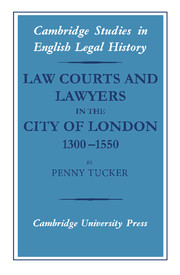Book contents
- Frontmatter
- Contents
- Acknowledgements
- List of abbreviations
- List of figures
- Introduction
- 1 The administration of the law by the city in context
- 2 The distinctiveness of city law and custom
- 3 The city law courts
- 4 The administration of the law in the city's courts: I
- 5 The administration of the law in the city's courts: II
- 6 Judges, jurors and litigants
- 7 The city's law officers
- 8 Legal representation in the city
- 9 The effectiveness of the administration of the law by the city
- 10 Interchange and exchange between the city and the common law
- Appendices
- Bibliography
- Index
4 - The administration of the law in the city's courts: I
Published online by Cambridge University Press: 04 August 2010
- Frontmatter
- Contents
- Acknowledgements
- List of abbreviations
- List of figures
- Introduction
- 1 The administration of the law by the city in context
- 2 The distinctiveness of city law and custom
- 3 The city law courts
- 4 The administration of the law in the city's courts: I
- 5 The administration of the law in the city's courts: II
- 6 Judges, jurors and litigants
- 7 The city's law officers
- 8 Legal representation in the city
- 9 The effectiveness of the administration of the law by the city
- 10 Interchange and exchange between the city and the common law
- Appendices
- Bibliography
- Index
Summary
INTRODUCTION
This chapter and the next examine the practical aspects of the administration of the law in the main city courts: in the case of this chapter, where they sat, when they sat, how flexible or inflexible their programmes were, and how much of each type of ‘legal business’, particularly private litigation, they dealt with.
LOCATION OF THE COURTS
We know that the Husting was in session at Guildhall in 1252. Indeed, it may well have been held there from the second quarter of the twelfth century, when a city guildhall is first recorded. Sessions of the Mayor's Court were from its earliest days doubtless held somewhere in Guildhall, too. In 1298, a man complained that he had been attacked by another man, in the presence of the mayor and alderman, when he ‘was attending Guildhall … in order to receive the judgment of right adjudged to him’ in an earlier case. This incident might have occurred in either the Mayor's Court or the Husting; but the fact that the sheriffs, who were the mayor's co-judges in the Husting, are not mentioned suggests that it was the former. In contrast, for most of the thirteenth century sessions before the sheriffs outside the Husting were apparently held ‘en hostiel des Viscontes’ (which could mean either the sheriffs' own houses or their counters), presumably because of their informal character.
- Type
- Chapter
- Information
- Law Courts and Lawyers in the City of London 1300–1550 , pp. 131 - 163Publisher: Cambridge University PressPrint publication year: 2007



